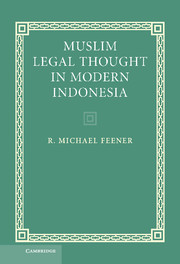Book contents
- Frontmatter
- Contents
- Acknowledgments
- A note on transliteration
- List of abbreviations
- Preface: Toward an intellectual history of modern Indonesian Islam
- 1 Technology, training, and cultural transformation
- 2 The open gate of ijtihād
- 3 An “Indonesian madhhab”
- 4 Sharī ʿa Islam in a Pancasila nation
- 5 New Muslim intellectuals and the “re-actualization” of Islam
- 6 The new ‘ulamā’
- 7 Next generation fiqh?
- Conclusion
- Bibliography
- Index
1 - Technology, training, and cultural transformation
Published online by Cambridge University Press: 29 September 2009
- Frontmatter
- Contents
- Acknowledgments
- A note on transliteration
- List of abbreviations
- Preface: Toward an intellectual history of modern Indonesian Islam
- 1 Technology, training, and cultural transformation
- 2 The open gate of ijtihād
- 3 An “Indonesian madhhab”
- 4 Sharī ʿa Islam in a Pancasila nation
- 5 New Muslim intellectuals and the “re-actualization” of Islam
- 6 The new ‘ulamā’
- 7 Next generation fiqh?
- Conclusion
- Bibliography
- Index
Summary
When a change in a society's self-awareness has become at all widely disseminated, that society's styles of thinking and acting have been irreversibly altered.
– J. G. A. Pocock, “Time, Institutions and Action”The late nineteenth and early twentieth centuries witnessed a number of remarkable developments in Muslim institutional and intellectual history, as a result of which the very categories and structures of traditional religious authority were subjected to fundamental challenges. This had a significant impact not only upon social and cultural institutions, but also on the form and content of Islamic religious and legal debates in the modern period. This being said, however, some qualifying remarks must be made with regard to the apparent novelty of the modern situation. For among these relatively recent developments are also distinctly traceable and historically significant threads of continuity that have run through centuries of Islamic history.
MODERNIZATION AND TRADITIONS OF REFORM
Internal reform is part of a well-established dynamic visible throughout the histories of various societies in the Muslim world. During the first half of the twentieth century, Henri Laoust remarked insightfully on the importance of the legacy of the medieval Ḥanbalī scholar Ibn Taymiyya (d. 1328) to the modern Salafiyya movement, and later historians have since ventured more general reflections on the role of Ḥanbalism, Sufism, and other established modes of Islamic religious understanding in the dynamics of reform movements throughout Muslim history.
- Type
- Chapter
- Information
- Muslim Legal Thought in Modern Indonesia , pp. 1 - 23Publisher: Cambridge University PressPrint publication year: 2007



